 Confessions and Reflections of a Traveler, by Brett R. McLean (Iona Press, Vancouver, 200)
Confessions and Reflections of a Traveler, by Brett R. McLean (Iona Press, Vancouver, 200)
If you can't judge a book by its cover, you can't judge it by random samples, either.
Both of our book-loving girls married book-loving men, so a visit to the grandchildren often leads to picking up random books, which might be found anywhere in the house. This particular book was on the bathroom reading shelf, and I found myself picking it up several times a day. In this manner I read many small samplings of the book, taken randomly from the middle.
McLean and a college companion decided one summer to travel across the United States on half a shoestring. Since this is what Porter did some 20 years earlier, I thought the book might be a good gift for some upcoming occasion. To be certain, I decided to borrow the book and begin at the beginning.
Whoa. Nothing I had read in the bathroom had prepared me for what the book was really about: philosophy. That's not McLean's fault; he says so up front. But I'd never read the front, nor, amazingly, encountered any of his dissertation on the history of philosophy, for which the travelogue is merely a series of examples.
I'm not sure this deserves to be called a review, since I was borrowing a borrowed book and reading on a very tight deadline. I ready very quickly over the philosophy, and I'm sure that if I'd had time to be interested in the history of philosophy, I'd have gotten more out of it. But as a book about travelling across America—and therefore appropriate as the gift I was looking for—Confessions and Reflections of a Traveler fails.
What still amazes me is that I missed the main point of the book in all my bathroom reading. My eyes must have unconsciously selected the parts I'd find most interesting, which in the main was the travel stories.
There was one exception: One time I found myself in the middle of the story of a plane crash, in which the survivors found themselves on an island. Still thinking I was reading the story of McLean's journey, I became more and more confused as details emerged. I didn't remember news of that particular crash, but even though I'm not always up on current events, surely I couldn't have avoided hearing about this bizarre story as it unfolded.
Reading the entire book made the puzzle clear: McLean uses not only his own experiences to explain various philosophies in action, but also two examples from pop culture: The Lord of the Rings, and an American television show called Lost. The latter was the source of the plane crash adventure.
I'm not above using stories, fiction or non-fiction, to help me understand and explain life. In many ways that's the best part of reading. But for some reason it really annoyed me in this book. Less so the examples from Lost, since I knew nothing at all about the show, but I kept disagreeing with what McLean said about Tolkien's work, and that short-circuited whatever point he was trying to make.
Philosophy, like history, is not something the completely ignorant (like me) can grasp without a fair amount of effort. I'm finally beginning to make headway in history; when I get around to putting the same effort into philosophy*, it might be good to revisit this book.


